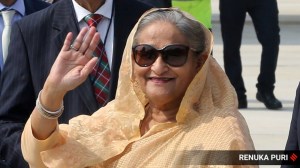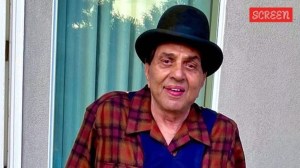No food for anti-nuclear deal thoughts
“The distance between Nehru and Manmohan is 123,” a tired Abdu Raihman explains before lapsing into silence.

“The distance between Nehru and Manmohan is 123,” a tired Abdu Raihman explains before lapsing into silence. The 25-year-old is part of a group of 13 students from Kerala who have organised themselves under the banner of “Students Against Nuclear Power” and are currently in the midst of an “indefinite hunger strike.” This morning they received a visit from P C Thomas and K S Manoj, both prominent CPI (M) MP’s from Kerala, who urged them to call off their strike, “They told us that they would raise the matter in the Parliament, but we have decided to hold fort and urge students across the country to raise their voice against this irrelevant deal,” Raihman said.
An eclectic mix of individuals, the protestors discovered each other at a college in Devagiri, Kerala, while pursuing their Master’s in Social Work. “The college authorities do not approve of our protest so please don’t mention the name of the college,” Sajis Matthew says. At 32, he is the oldest in the group and on the way to acquiring his third post-graduate degree. His parents, too, are unaware that he is in the Capital to take part in a hunger strike, “but it is my responsibility as a citizen to highlight how the UPA Government is misleading the country into believing that this nuclear deal will solve all our energy problems,” he says.
“The first two days were challenging, but now I feel I can comfortably survive without food for three more days,” he says. When he decides to step down, another among the group will promptly replace him. It could be the soft spoken Subish T, whose main concern at the moment is the wellbeing of three of his colleagues. “Tomy and Divya are in AIIMS, their blood pressure has rocketed and they are being administered saline drip.” He is interrupted by Ranjith K, “Our comrades will want to rejoin as soon as they feel better,” he explains and then immediately regrets his choice of the word “comrade.”
“By comrades I do not mean to imply any Leftist allegiance. We are not opposing the deal for the same reasons as the Marxist party. They would probably support the deal if it was with Russia or China, but we would still oppose it.”
But moral support has come from activist Medha Patkar. “I support their cause and I admire them for raising their voices against the nuclear deal,” she says. “However, being an issue of political and global importance, I doubt the Government will be willing to engage in a dialogue with the youth.”
The students are quick to highlight that their protest has nothing to do with politics, “We all have our own political beliefs, but as far as this issue is concerned it is totally devoid of personal politics,” says Subish whose own father is an avid Congress supporter who had trouble coming to terms with his son’s decision to protest against the nuclear deal.





- 01
- 02
- 03
- 04
- 05


























